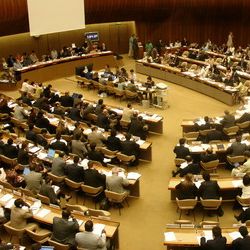The Special Rapporteur on the Situation of Human Rights Defenders will present her report to the Human Rights Council on 11 March. For the first time in her mandate, the Rapporteur is focusing on the security of human rights defenders, mentioning, among other things, good practices and examples. One of the good practices mentioned in the report is the South Caucasus Network of Human Rights Defenders.
The resolution to be adopted during this session of the HR Council, will also focus on the protection of human rights defenders.
The Human Rights House Foundation is advocating for the necessity of a specific language that clarifies the measure which, we believe, are critical for the protection of human rights defenders: concrete actions should be taken into account and should figure in the resolution as examples. Therefore, HRHF has proposed the following input to be added to the resolution, along with other important recommendations made by numerous international human rights organisations in Geneva:
“Invites States as part of protection measures to provide emergency visas, facilitate shelter in a safe location, provide access to medical aid and legal assistance to human rights defenders and their relatives at risk, and to provide them with financial support.”
The draft resolution’s operative points begin by urging States “to create an enabling environment for human rights defenders, in which they can operate free from hindrance and insecurity.”
NGO and civil society laws that de facto prohibit the freedom of association and assembly, or the right to be a human rights defender along with other kind of administrative and bureaucratic restriction on human rights organisations, would clearly be a hindrance for human rights defenders to fulfil their activities. In addition to that, the draft resolution points out the importance of the work of human rights defenders. In the draft, the States are urged “to publicly acknowledge the important role of human rights defenders and the legitimacy of their work as an essential component of ensuring their protection, including by publicly denouncing attempts to discredit the work of human rights.” This is an important step forward, since it calls upon the political leaders of each country to support the work done by human rights defenders.
In its operative point 6, the states are urged to “take timely and effective action to prevent and protect against attacks on and threats to persons engaged in promoting and defending human rights and fundamental freedoms and their relatives.” Given the importance of the actions that can be taken to protect human rights defenders, HRHF has proposed to add the above-mentioned operative point containing specific protection measures.
The draft recommendation also urges states “to ensure that officials, agencies, authorities and members of the judiciary involved in the protection of human rights defenders and their relatives are trained in human rights and the protection needs of human rights defenders at risk, including those promoting the rights of marginalized groups.” It is understood that “marginalised groups” are the ones that suffer more severe human rights violations, such as those human rights defenders who advocate for gender issues, sexual orientation (lesbian, gay, bisexual, and transsexual), and national minority groups rights.
Finally, besides calling upon states “to allocate sufficient resources for the effective implementation of necessary protection measures,” the resolution “urges States to investigate complaints and allegations on threats or human rights violations perpetrated against human rights defenders or their relatives in a prompt and effective manner, and initiate appropriate proceedings against the perpetrators to ensure that impunity for such acts is eliminated.”
As a whole, the first draft resolution presented end of February 2010 makes sense and can be understood, even if clearer language would have been welcome. The danger now is that the resolution might be weakened in the negotiation process leading up to the adoption.





